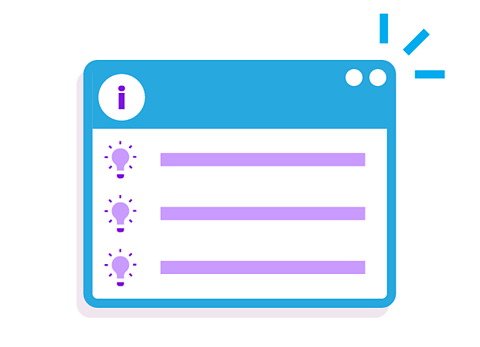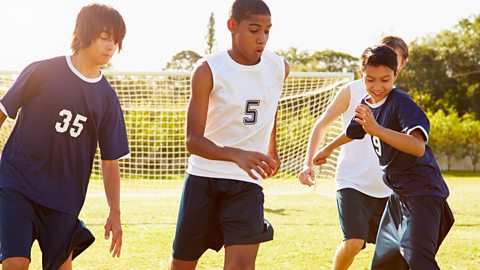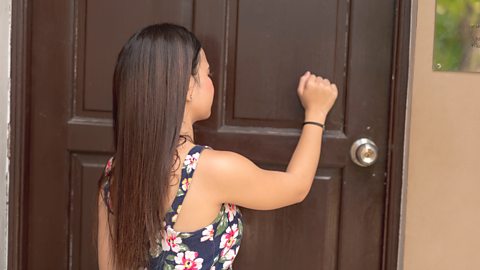Key points about reflexive pronouns in Spanish

- Reflexive pronouns are used with reflexive verbFormed in the same way as regular ar/er/ir verbs but includes a reflexive pronoun (eg me, te, se). Often used to describe actions that we do to ourselves., when the subject performs an action to itself, or when talking about relationships with other people.
- The reflexive pronoun comes before the conjugated verb.
- The reflexive pronoun is attached to the end of an infinitiveForm of the verb that has not been conjugated. Usually translated with 'to' in English, eg to play..
When to use reflexive pronouns in Spanish
Reflexive pronouns are used with reflexive verbs, when the subject performs an action to itself. For example:
me lavo - I wash myself
The infinitive of reflexive verbs ends in se.
- Reflexive verbs are particularly useful when talking about daily routine.
For example:
Sorry, something went wrongCheck your connection, refresh the page and try again. - to go to bed
Sorry, something went wrongCheck your connection, refresh the page and try again. - to have a shower
Sorry, something went wrongCheck your connection, refresh the page and try again. - to wake up
Sorry, something went wrongCheck your connection, refresh the page and try again. - to get dressed
- Reflexive verbs are also used for talking about relationships with other people.
For example:
Sorry, something went wrongCheck your connection, refresh the page and try again. - to get married
Sorry, something went wrongCheck your connection, refresh the page and try again. - to get on well
Sorry, something went wrongCheck your connection, refresh the page and try again. - to get divorced
Sorry, something went wrongCheck your connection, refresh the page and try again. - to argue
Reflexive pronouns in Spanish
The reflexive pronouns in Spanish are:
| Sorry, something went wrongCheck your connection, refresh the page and try again. | myself |
| Sorry, something went wrongCheck your connection, refresh the page and try again. | yourself (informal) |
| Sorry, something went wrongCheck your connection, refresh the page and try again. | himself, herself, itself, yourself (formal) |
| Sorry, something went wrongCheck your connection, refresh the page and try again. | ourselves |
| Sorry, something went wrongCheck your connection, refresh the page and try again. | yourselves (informal) |
| Sorry, something went wrongCheck your connection, refresh the page and try again. | themselves, yourselves (formal) |
Position of reflexive pronouns in Spanish
Reflexive pronouns usually come before the verb.
For example:
Me lavo. - I wash myself.
Se duchĆ³. - He/she had a shower.
Nos levantaremos. - We will get up.
Nos vestimos. - We get dressed.
Position of reflexive pronouns when using the infinitive
When the verb appears in the infinitive form, the reflexive pronoun is attached to the end of the verb.
For example:
Sorry, something went wrongCheck your connection, refresh the page and try again. - to go to bed
Sorry, something went wrongCheck your connection, refresh the page and try again. - to get dressed
When the infinitive follows another verb, the reflexive pronoun is also attached to the end of the infinitive. Remember that it will not necessarily be se and you will need to change it according to who is doing the action.
For example:
Sorry, something went wrongCheck your connection, refresh the page and try again. - We want to sit down.
In this case queremos has the we ending so we know it means āwe wantā and therefore the reflexive pronoun attached to sentar must be nos.
More examples:
Sorry, something went wrongCheck your connection, refresh the page and try again. - He/she can have a bath.
Sorry, something went wrongCheck your connection, refresh the page and try again. - Do you like taking a shower?
Position of reflexive pronouns when using the Immediate future tense
In the immediate future tenseUsed to describle what someone is going to do in the near future, eg I am going to watch, he is going to arrive. Formed with the present tense of 'ir' (to go), followed by 'a' and the infinitive., the reflexive pronoun is also attached to the end of the infinitive verb. Remember that it will not necessarily be se and you will need to change it according to who is doing the action.
For example:
Nunca voy a casarme. - I am never going to get married.
MaƱana vamos a despertarnos temprano. - Tomorrow weāre going to wake up early.
Las chicas van a acostarse a las diez. - The girls are going to go to bed at ten.
Quiz - Reflexive pronouns
Practise what you've learned about reflexive pronouns in Spanish with this quiz.
Now you have learned about reflexive pronouns in Spanish why not explore constructions with 'lo'?
More on Pronouns
Find out more by working through a topic
- count5 of 9

- count6 of 9

- count7 of 9

- count8 of 9
